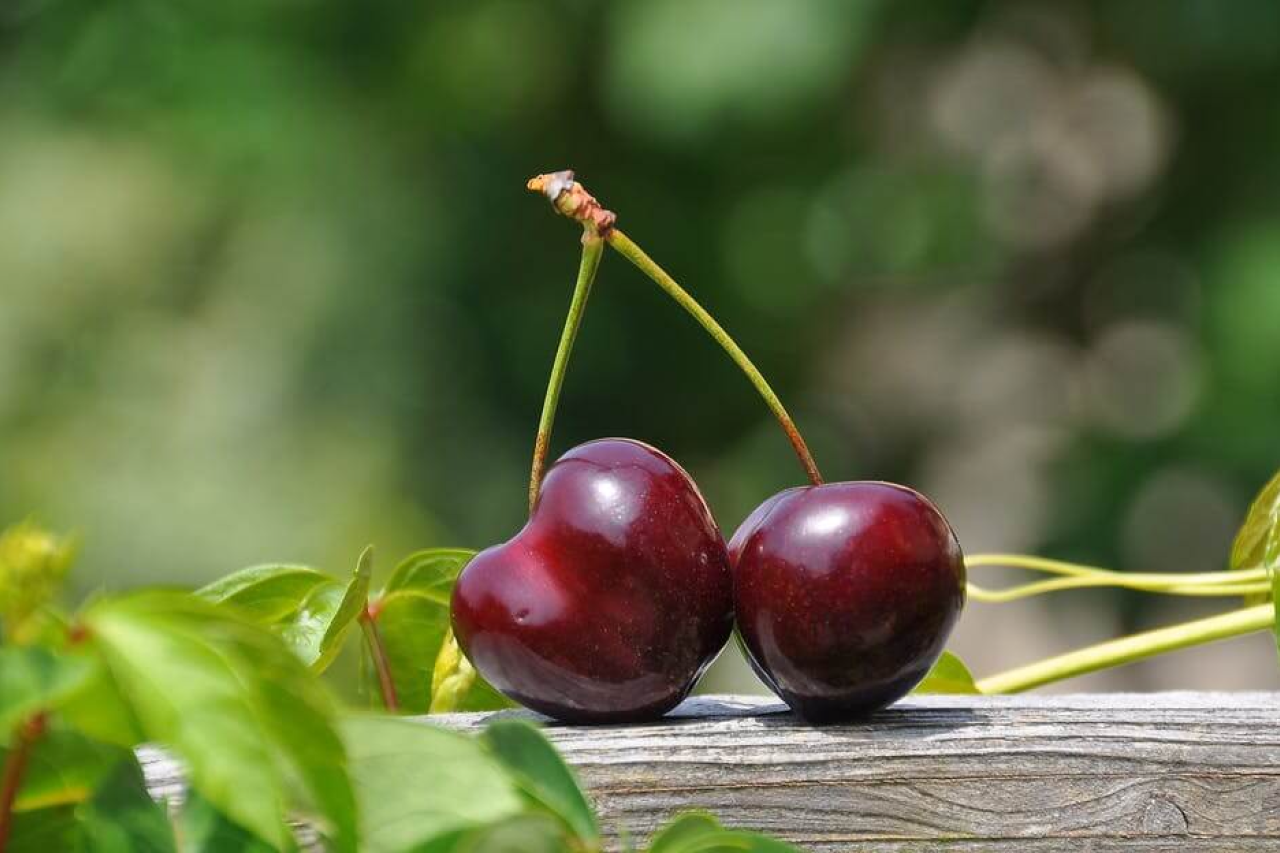
Can Dogs Eat Cherries?
Just like chocolate, the short answer to this question is no dogs can't eat cherries.
But, it also depends on the quantity and how the cherries are served. Let's take a look at the reasons why cherries aren't a good idea for pups.
The Seeds and Stems of Cherries Are Toxic
The seeds and stems of cherries contain cyanogenic glycoside (cyanide). While the concentration of this toxin is low, it's not worth the risk.
The toxin only gets released when those stems and seeds are broken through chewing. If a dog eats enough cherries, including seeds and stems, there's a risk it could be fatal.
There's always a chance your dog will wolf them down practically whole, but then you have to worry about those pits getting stuck in a dog's digestive tract, which could lead to intestinal blockages.
Of course, there's a chance they'd be fine, but is it worth the risk?
Your Canine's Canines Could Get Damaged
Cherry pits are brutally hard, even for a dog's chompers. If your pup bites down on cherries, she could damage her teeth and end up in a lot of pain.
They Could Get Sick From Mold On The Cherries
Certain types of mold can really make dogs sick. When it comes to cherries, it's possible for the flesh of the fruit to be fresh with a moldy pit inside.
Mold illness can cause an upset stomach, liver failure, and even tremors - another reason to only give your pup the flesh of the cherries.
Cherries Are High in Sugar
A lot of dogs like sweet flavors, but cherries are high in sugar. If you don't want to give your pup a sugar rush, you could opt to give him just a few fresh pit-free, stem-free cherries on special occasions.
Your Dog's Esophagus Could Get Damaged
There is a possibility for your dog's esophagus to suffer damage from cherry pits and stems. A pit that gets stuck in or tears the esophagus lining can cause serious damage.
Some of these symptoms include lethargy, vomiting and regurgitation, gagging, and not eating.

Avoid a trip to the Vet by not feeding your dog cherries!
Can Dogs Eat Cherries Without Pits?
Technically, you can give your dog cherries without the seeds and stems. Cherries are an extremely nutritious fruit. They're packed with healthy nutrients such as dietary fiber, vitamin A, and antioxidants but there are a few reasons that we recommend you don't give your dog cherries.
Cherries have a high concentration of sugar, however, so you should only give your dog a few cherries at a time. Plus, even the fruit of cherries can cause intestinal obstruction in dogs. If you're giving cherries to your pup for the first time, be sure to observe to determine whether or not they're cherry sensitive.
Can Dogs Eat Dried Cherries?
Dried fruit tends to have a higher sugar content than fresh fruit. It's probably in your best friend's best interest to avoid giving her dried cherries because of the high sugar content found in a cherry.
If your pup loves cherries, and you know that it doesn't upset her stomach, opt to only give her fresh cherry fruit, without the stems and pits, and only a few at a time.
What Symptoms Occur From a Dog Eating Cherries?
It's up to you if you want to share your cherry treat with your pup. Just make sure you never give him the stems or pits and that he only enjoys the fruit from a few cherries.
If your pup does get into and ingest more than a few cherries, here are some of the cyanide poisoning signs to look for:
- Dilated pupils
- Panting
- Shock
- Difficulty breathing
- Brick red mucous membranes
- Salivation
- Convulsions or paralysis
- Cherry-red gums
Cyanide toxicity means that the oxygen in your dog's blood can't be released to the cells. This can lead to suffocation quickly, and you shouldn't hesitate to call your vet.
What Are Some Safe Cherry Alternatives?
If you and your pup love sharing delicious fruit together on a hot summer day, don't be discouraged! There is plenty of fruit that's not only safe but good for your dog!
Blueberries
Blueberries are a superfood. They're not as high in sugar as cherries, and they're rich in antioxidants, which can prevent cell damage in both canines and humans.
They're also packed with fiber and an excellent way to teach your dog to catch treats in the air.
Peaches, and Pears, and Apples
Peaches can help fight infections, and they're an excellent source of vitamin A and fiber. Just remember, peach pits also contain cyanide, so be sure to remove them first. Avoid canned peaches because they contain high amounts of added sugar.
Pears are great for dogs too. They're high in vitamins K and C, copper, and fiber. Make sure that, just like peaches, you cut the fruit into small chunks and remove the pit.
Apples are great sources of vitamins A and C. They're full of fiber for your pup. Remember to remove the core and the seeds first, and cut them into thin slices.
More Great Treats
Here are some other fruits that are safe for your dog to eat:
- Strawberries
- Watermelon
- Pineapple
- Mango
- Cucumber
Just remember to always remove any pits, seeds, stems, leaves, and rinds from all fruit you give your dog.
What Other Fruits Aren't Safe?
While we're on the subject, here are a few other fruits you should avoid giving your pet:
- Avocados
- Grapes
- Tomatoes
Don't EVER give your dog grapes. They can be toxic to dogs, regardless of the breed, age, or sex. Grapes can lead to acute kidney failure and are never worth the risk.




























